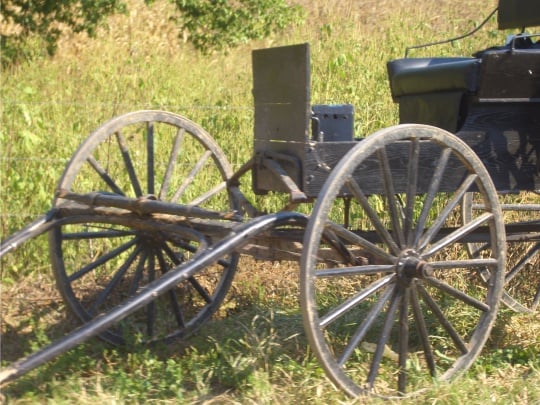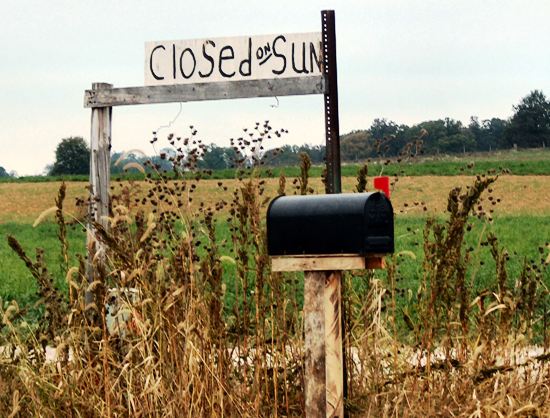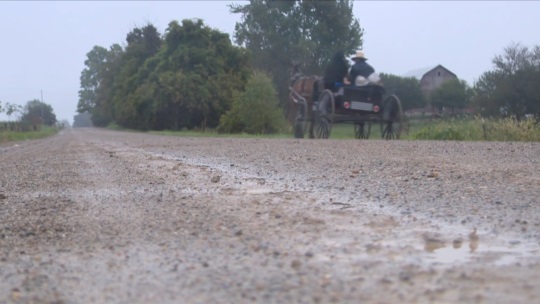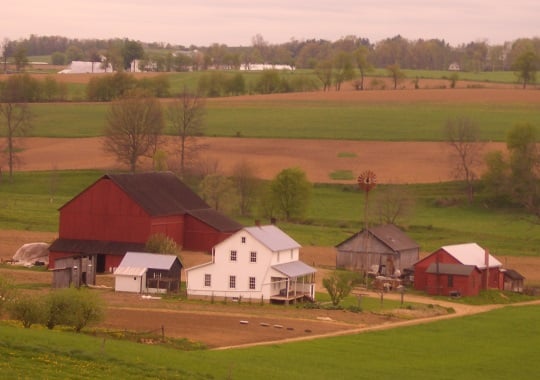Sexual Abuse Awareness Program Leads To Arrest, Conviction Of Amishman
An Amishman was sentenced Thursday in Dauphin County, PA for sexually abusing four girls when he was a teenager. From Penn Live:
The 11 ½- to 23-month prison term President Judge Richard A. Lewis imposed on King was set in an agreement King reached when he pleaded guilty to multiple charges, including aggravated indecent assault, in April.
King, now 33 and a Lebanon County resident, is to serve his sentence in the county work-release center, then spend another 5 years on probation and perform 500 hours of community service.
The victims’ response:
Adam said King’s victims agreed with his plea deal and are willing to forgive him.
“Nevertheless, there’s still a price to pay under Pennsylvania law,” Lewis told King.
King will be allowed to attend church, having been granted an exception to sex offender regulations.

This conviction comes following sexual abuse awareness efforts from Deputy District Attorney Katie Adam and other authorities:
His arrest apparently stems from a sexual abuse awareness program she, county victim advocates and the state police offered to Amish bishops in upper Dauphin County and Northumberland and Schuylkill counties in 2017, Adam said. She said numerous anonymous tips were reported to police from Amish sources after that program.
Dauphin County was the site of two other recent abuse-related convictions in the Amish community – of a sexual abuser, and also a bishop for failing to report the abuse.
Critics have long held that sexual abuse is an issue which needs to be addressed in Plain communities. For example, it has happened that church discipline has superseded legal consequences for abusers. Here is a description of the problem from the perspective of one survivor. This post describes some of the challenges hampering reporting of abuse in some communities. A recent six-part series in the Pittsburgh Post-Gazette also explored this painful and difficult topic.
After the experience of the bishop being charged for failing to report, and the awareness program, perhaps things are changing in these communities. If the awareness program has made people within the Plain community more comfortable reporting when crimes are being committed, that can only be a good thing.
How many communities have had these programs however, and how many might benefit from them?






sexual abuse among amish
I grew up in Lancaster county from 1st thru 12th grade.
My understanding re sex is that it is taboo to talk about it. Although not Amish, the same attitude prevailed in other families as well.
The Amish have many fine qualities, probably relatively few are lawbreakers. The demand and desire to keep criminal activity ‘in house’ adds to image of doing no wrong.
I believe in the above case, the punishment is appropriate culturally, but it will not really provide justice for victims. Now that it is public knowledge, the response of the church may be far worse.
Thank you for addressing this important issue
Erik, I want to thank you for addressing this issue. There have been many news stories about sexual abuse in Amish country these past months. I find it odd that King “was sentenced to prison Thursday by a Dauphin County judge” and yet later in the report it states, “King, now 33 and a Lebanon County resident, is to serve his sentence in the county work-release center, then spend another 5 years on probation and perform 500 hours of community service.” The second statement makes it sound like he isn’t going to prison.
I also found it odd that he was given an exemption to attend Amish church services. Anyone who has attended an Amish church service knows that is a setting in which a perpetrator has access to innocent children.
In my view, it is time for Amish perpetrators to be treated like any others. This would include counseling from secular counselors not affiliated with the “culturally appropriate” Amish-run mental health centers.
That most perpetrators were themselves abused is well-known in the field of psychology. In a culture that doesn’t encourage self-reflection, it is hard to break the unhealthy patterns that exist in the Amish culture. When Amish folks aren’t taught how to discern unhealthy patterns from the cultural traditions that they accept without question, there is little chance of correcting their own behavior so as not to pass it down to the next generation. You heard me talking about this at the Amish conference in June.
Silence always shrouds abuse. Once it has been brought into the light, it is impossible for the perpetrators to hide their abuse in the shadows.
Very often Amish abusers do admit to their “sins.” What they are admitting to is a different understanding than what most people think. In their understanding, they have committed the sin of adultery, same as if they had sexual relations with a consenting adult outside of marriage. They don’t see this as a crime that harms the children they abused. This is an important distinction to be made.
Thank you again for addressing this important issue, Erik. I know you have cautioned against overestimating the number of abuses that happen in Amish communities in the past. There is an even greater danger of underestimating the number, which can tend to minimize the experiences of the abused. The more they feel they’re not alone, the more they will be willing to come forward and tell their truth. Releasing ourselves of the agony of our untold stories is always the first step towards breaking the cycle of abuse — and it is our first step towards healing.
Thank you
Thank you Saloma for your considered and wise response to this article. As a survivour of abuse (within a church context, but not Amish) I find your response heartening. I agree that disclosure is the start of healing.
Blessings
Maxine
You're welcome, Maxine, and thank you too.
I find the exemptions made for the Amish upsetting when it comes to child abuse — whether it’s physical or sexual. Children are defenseless. Amish children are even more so because of the emphasis on obedience. And I find it appalling when there is little or no thought within the culture about the children who were abused. I think change has to come from the outside culture. It seems this is one of the cases where the program was from the outside to uncover the abuse. Perhaps this kind of program should be implemented in all Amish communities… creating a safe space for victims and their advocates to come forward.
I’m so sorry for your experiences of abuse. Me too.
Peace,
Saloma
Saloma your first-hand perspective on this issue, especially as someone who comes from the Amish, is always appreciated here.
I also noticed that about the actual conditions of the sentence – it does sound like it is not going to be actual prison. I have noticed in other cases involving Amish – not just abuse-related ones – that punishments seem to take Amish cultural and religious factors into account, and my impression is that the outcome can end up being more lenient than what you would otherwise expect – at least that’s my impression.
Erik/Amish, He will serve his time in a county work release center, which is a prison. Prison Work Release is a program where the prisoner can be released during the day to work at a approved profession, but must return to the prison/center after each day of working. I sounds like they will allow some release time to attend church as well.
Most importantly...
In my opinion, the most important question concerning the sentence is whether or not King has access to children during his work release. We know he does when he attends church, so this is already a problem. And I agree, Erik, that it does seem like the Amish perpetrators get off easier than those in mainstream society. “Culturally appropriate” is not always a good thing. Even being put on the sex offender list has a different meaning among the Amish. If they feel that the offender has shown sufficient remorse for his offense, then they will “forgive and forget” which means wiping the slate clean and trusting him completely. If a mother were to be seen as keeping her children away from him, she would be seen as someone who has not forgiven and forgotten. Then SHE has to go before the church and make a public confession for not having a forgiving heart.
What most people don’t realize is that the Amish literally have a whole different psychology than those in mainstream society. It is no wonder their lifestyle is so shrouded in mystery.
Abuse
By the little I read his crime was when he was a teenager not as an adult and the abuse was with 4_girls. Nothing indicates his victims were children,
And Saloma I agree that creating an environment where it is more comfortable for them to come forward can only be a good thing. As an addendum to the question with which I closed the post, I also wonder if the results of this program – more people coming forward anonymously – are something other Amish communities will see as a good thing, and if churches will proactively request something similar for themselves.
Probably not...
Erik, my guess is that as word gets around, other communities will close up even more and NOT welcome such a program because, “Look at what happened in Dauphin County.” I would love to be surprised on this.
Well, get ready to be surprised, but in a good way. Such programs are coming into our community with a lot of support and concern. I’m also thinking of a recent case in Holmes Co. where once the bishop was informed of a molestation case, he gave the abuser until noon the next day (roughly 15 hours as this was in the early evening) to turn himself in to the law and make a confession to them or HE would. This was supported by the church & neighborhood and the abuser (who is an older man) is serving a prison sentence with very strict guidelines, unable to even attend his wife’s funeral. (Though he was taken to the funeral home for a private farewell.) As for me and others — we are glad to see the tide changing but very sad it needed to be changed at all. This type of crime should not happen to anyone anywhere but yet unfortunately seems to be found in many settings. I do believe that different church groups and/ or communities handle this differently, though, with some taking a more active approach and others still (shamefully) with more denial.
So glad to hear this...
To “Yoder in Ohio” I thank you kindly for your comments. I am so heartened to hear this. Holmes County is often a model for other communities, so let’s hope this spreads to other communities also. I cannot tell you how much it means to know this.
The story of the older man who had a private farewell with his departed wife is a sad one, but also heartening. How appropriate that he got that chance, but the children at the funeral were protected from him. It was a creative way of handling the situation, whoever came up with the idea.
Thank you again for your perspective.
You’re welcome. I’m actually not sure who came up with the private farewell, as to whether it was a legal requirement or a decision made by the family and church, or both, but I did not hear anyone criticizing or questioning the decision at all.
Thanks for your input on this topic, Yoder. Sounds positive.
Additional Areas
Are there any reports of this behavior in the Big Valley?
I don’t recall any cases in the news about that area, and a quick Google search didn’t reveal anything, for what that’s worth.
Big valley
Thank you, Erik, that’s good to know.
Not surprised
Finally somebody is doing something about the Amish. You can’t hide behind your religion forever, God sees all! Of course his victims are gonna forgive, that’s what they are taught but i also don’t like that he isn’t sitting in jail along side the rest. The bishops of these churches need to be help accountable 100 percent also. They are no different than the rest of we mandated reporters!
Is everyone entilted to a “religious exemption” for child sex abuse in the Amish community?
That isn’t “change”, it’s special circumstances for a religious exemption, and that’s crap.
He gets to attend church with his victims?
That’s not “justice”, it’s a slap in the face.
He should be in PRISON, where a rapist child molester belongs. NO ONE is safe in that community with that predator on the loose!
Eric; what are young Children do, when it’s their attention to behave properly?
My point is; Children are being abuse by their Parents, by grating drunk. Obviously, their Religion via their Bishop, have no clue about the Parents behaving inappropriately?
Three are still Federal Laws that Prohibits Child abuse. .how are these kids alert the Sheriff? Obviously, Cell Phones are Prohibited. I sure hope that the older siblings will have enough common sense to use the Amish Phones or the Neighbors Phone & call 911.
Could you please explain my point?
Thanks
I don’t know exactly how the reporting system is set up here, but it sounds like it can be done anonymously. Many Amish communities have phone arrangements such as shared phone shanties, so I assume that would be the most accessible way to report.